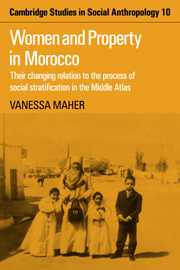 Women and Property in Morocco
Women and Property in Morocco Published online by Cambridge University Press: 27 October 2009
The content and distribution of modern education in the Akhdar region prevent the majority of Akhdaris from becoming socially mobile. This is especially true in the case of women for the value system which reserves the ‘public sphere’ for men and excludes women from it also requires the training of women to be entirely domestic so that they are unemployable and economically dependent. They do not acquire a grasp of the principles on which is based the culture from which Moroccan education is derived. Their behaviour continues to be dictated by the ascribed status they occupy.
I was fortunate to be able to visit most of the schools in the administrative district of Akhdar. It will be useful to divide the social universe into the familiar categories of rural, urban, meaning Akhdar, semi-urban, meaning the ksour situated within 5 kilometres of Akhdar and closely integrated with it economically. The majority of the inhabitants of these ksour depend for their livelihood either on wagelabour, or on a combination of agricultural production and sporadic employment in the town. The first category comprises the rural ksour beyond the five-kilometre limit, whose economy may be considered almost entirely agricultural. Urban culture barely impinges on these villages. For them, the town represents a market for produce and a source of consumer goods, but not of behavioural models.
To save this book to your Kindle, first ensure no-reply@cambridge.org is added to your Approved Personal Document E-mail List under your Personal Document Settings on the Manage Your Content and Devices page of your Amazon account. Then enter the ‘name’ part of your Kindle email address below. Find out more about saving to your Kindle.
Note you can select to save to either the @free.kindle.com or @kindle.com variations. ‘@free.kindle.com’ emails are free but can only be saved to your device when it is connected to wi-fi. ‘@kindle.com’ emails can be delivered even when you are not connected to wi-fi, but note that service fees apply.
Find out more about the Kindle Personal Document Service.
To save content items to your account, please confirm that you agree to abide by our usage policies. If this is the first time you use this feature, you will be asked to authorise Cambridge Core to connect with your account. Find out more about saving content to Dropbox.
To save content items to your account, please confirm that you agree to abide by our usage policies. If this is the first time you use this feature, you will be asked to authorise Cambridge Core to connect with your account. Find out more about saving content to Google Drive.